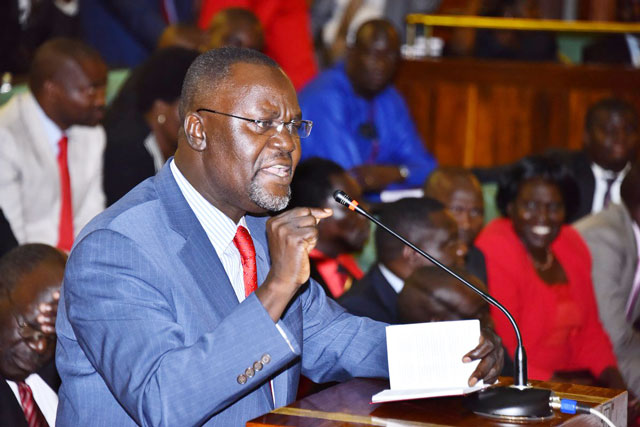
Katuntu counseled that the failure to interpret the rules of suspension of rules sends a negative signal that; we are rushing because of other reasons.
“The Mwesigwa Rukutana motion” was eventually endorsed and at 6:15pm, the NRM members sailed through as they voted to have the rule (201) (2) suspended.”
“So let us now debate,” Kadaga said, amidst jeers and noise from the Opposition MPs.
At around 3.15pm, Winnie Kiiza asked members of the Opposition “who believe like she does” to vacate the House and consult. Dozens of Opposition MPs walked out for consultations. That consultation lasted one hour.
Akol says most MPs were behaving that way because they had been given money and promised seven more years.
“This is not right,” he says, “What is happening in Parliament is pure greed of the highest order. Challenging her became too much for her.”
“We are going to challenge it not in the courts of Uganda but in the East African Court of Justice because it is a waste of time challenging it here,” Akol said.
Part of the rules of procedure raised was that some members who signed the report belonged to more than one committee already which is not allowed.
Yusuf Nsibambi, a Kampala-based Constitutional lawyer told The Independent on Dec. 14 that Kadaga’s rulings show that she was not in control and was in a hurry to pass the bill.
Nsibambi said the committee took time to look at the bill, there were two reports which means we are dealing with a contentious issue, and it was not right for the Speaker to rush MPs through it.
He says the MPs should have been given time to read and understand the reports. It was unconstitutional to allow attorney general to suspend these rules.
Amending the Constitution, he says, is a safety valve matter and the constitution had three safeguards where the age limit is the only one remaining there.
The first safety valve is ensuring smooth transition of power and the second is allowing for MPs to be recalled from parliament through a vote of no-confidence –a thing that was removed during the movement system.
“Now what we have is a document that has no protection and this is a problem that should be dealt with,” he says.
Nsibambi told The Independent that since the constitution is a big thing instead of running through, they should have involved the people not just the consultations that even never happened.
Medard Lubega Ssegona, the MP Bukoto South who co-authored the minority report told The Independent that the motion was not only acrimonious but illegal.
Ssegona wondered why the MPs could not wait to do proper consultations. He said the certificate of financial implications for the Bill was inadequate and defective because whereas the law (Article 17) of the Finance Management Act requires that the certificate give a clear picture of how the Bill could affect the economy within the first two years. Finance Minister, Matia Kasaija, said it would not have any effect. But a week later, Parliament was spending Shs13 billion for the MPs to consult on the Bill, Ssegona said.
Nicholas Opio, the executive director of Chapter Four, a Kampala-based civil liberties NGO also told The Independent that the events in Parliament appear, on the face, to be the usual Parliamentary jostling but underneath it are political machinations by the NRM to use its tyranny of numbers to force through an evidently unpopular amendment of the Constitution.
Opio has taken exception to the fact that a private member has been used to move a Constitutional amendment. He finds this move unprecedented in Uganda’s history.
“Constitutional amendments are normally made on motions moved by the government,” Opio said, “Even though it is not unlawful, the use of a private member is quite unprecedented in the Constitutional history of our country.”
“These are machinations of the executive to get what they want but to also find a reason not to engage in comprehensive reforms as recommended by the Supreme Court.”
Opio says the reason why all rules of Parliamentary procedure (disregarding the 3-day grace period rule and the insistence on tabling of the bill) is in effect aimed at having the party get what it wants, however, illegitimate or unpopular the bill is.
But what is certainly true is that Ugandans who are opposed to this bill are going to punish their MPs who in the end have disregarded their feelings about the bill.
“Many of these MPs will be punished at the ballot just like what happened in 2005 when the removal of term limits happened.”
“Museveni will get what he wants but the MPs will suffer the consequences,” Opio said, “I know many MPs who are now living in abject poverty and destitution after they lost their seats because the NRM moved on and the MPs were left behind even though they facilitated the lifting of term limits.”
On the broader political sense, Opio says, he sees a situation of growing repression by the security forces because there is going to be much discontent and dissent across the country after this bill has been passed.
 The Independent Uganda: You get the Truth we Pay the Price
The Independent Uganda: You get the Truth we Pay the Price


